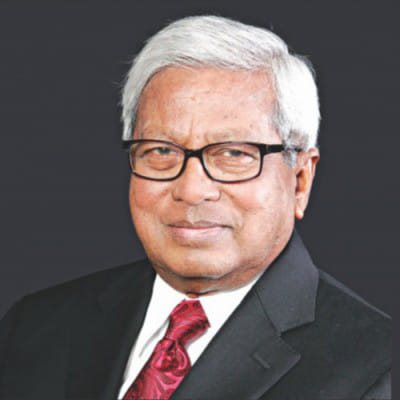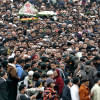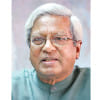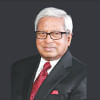Tribute To Sir Fazle Hasan Abed: He dreamt big and made them come true

Abed Bhai, as Sir Fazle Hasan Abed was lovingly called by almost all those who knew him, was well into his fatal illness when Cyclone Bulbul struck Bangladesh. As shared by Lady Abed and daughter Tamara during a recent conversation, as the cyclone wrought havoc, Abed, in a semiconscious state, was constantly rambling about what preparations have been made to rescue the victims and how quickly Brac will have to come to the aid of the children and rebuild the affected schools. Such was his attachment with the poor and the deprived.
During my last few minutes with him while he could still converse, albeit lying down and mostly with his eyes closed, he talked about press freedom, its need for democracy and for the future of Bangladesh, about how The Daily Star was doing, about never losing hope, never giving up and most importantly about his faith in the bright future of our people, the last being his article of faith. He reminisced about the paper’s early days and felt happy as the paper evolved with its commitment to pro-people journalism.
As I took slow and measured steps backwards away from him and out of the room, stealing last moment glances and lingering for as many more seconds as possible, I was overwhelmed by the sudden realisation that I would never again see him in his elegantly attired self, hear his calming, reassuring, encouraging and inspiring voice again, feel that gentle and affectionate touch that I rushed to receive in moments of my deepest frustrations, get his wise counsel on why it was vital to serve the poor, why it was crucial to reduce poverty, why education was the key to our future and how not to lose focus on accomplishing the tasks in hand. As I walked away, I was acutely aware that I was leaving behind a legend, the man who was a fountain of inspiration for all those who loved Bangladesh and sincerely devoted themselves to building it.
Along with our founder editor, SM Ali, we interviewed Abed in the early days of this paper, sometime in 1992. In the interview he made a striking comment that has remained with me till today. He said something to the effect that ‘Most of us manage various levels of wealth, but the poor women in Bangladesh manage poverty, and as such they are, by experience, far better managers than men’. Whatever meagre resources they have and whatever little the men earn, with that the women feed the family, run the household, provide education for the children, healthcare to the extent possible and inject whatever they can with their own income generating activities. Our women’s minds are consumed by the singular thought of keeping the family afloat with whatever they have and somehow move forward.
Abed’s absorbing description of women’s role - as managers, planners and navigators of poverty-shackled families’ fortune - suddenly made clear to me the insight of giving priority to women in our development activities. Managing poverty makes a woman acutely aware of the bits of resources they have. This awareness makes them far more efficient user of that resource. That is principally why the rate of return of micro-credit is nearly 99 percent (compare that with the NPL of our elite borrowers) as almost all the borrowers are women – each being managers par excellence.
A unique feature of Abed’s vision was its scale. He dreamt big and made them come true as if it was the only way of doing it. Brac’s becoming the biggest non-governmental organisation in the world and employing about 2 lakh people was only but natural for him. A massive non-formal education programme which at one point ran 63,000 schools, the biggest immunisation campaign ever, the most widespread public health campaign in the form of oral saline project in collaboration with icddr,b employing thousands to raise public awareness about empowerment, especially that of women, etc. were a part of his big dreams being realised. The oral saline project was the first ever door-to-door campaign to reduce death of children from widespread instances of diarrhoea, and it gave Abed that crucial confidence that public health habits could be changed and that he could do it by massive awareness campaigns through meticulous planning and disciplined organisation. This had a seminal impact on his self-confidence. He knew he could manage scale and he could now plan big. This was a turning point in Abed’s thinking and can be termed the real birth of Brac.
Did anybody ever imagine that Bangladesh, which has been on receiving end of global assistance, would end up assisting other countries? Brac now operates in 11 countries and has extended technical and other assistance to many others. The non-formal education model that Brac pioneered is now replicated in several dozen countries across the globe in various forms.
Since he dreamt big, he knew that without institutions to sustain and carry them forward they would not go very far. This led him to build institutions and what a superb builder he turned out to be. Brac Bank, Brac Institution of Governance and Brac University are but a few examples. Then there are those he built in partnership with others, like Delta-Brac Housing, bKash, Guardian Insurance. There are numerous civil society bodies that he helped set by working behind the scene such as Campe, Ain-o-Salish Kendra, etc. He assisted many others in setting up their own organisations.
A natural corollary of institution building is the need for management with particular emphasis on its financial aspects. In all the institutions Abed built he ensured the highest level of management with financial discipline being at its core. Brac’s microcredit programme, which gave out loans to the tune of $4.2 billion this year alone, functions without any blemish. All global donors like the World Bank, ADB, Soros Foundation, Melinda and Bill Gates Foundation, and many others extend resources to institutions set up by Abed literally without too many questions simply because they have enormous faith in Abed’s management standards. UK’s DFID has a strategic partnership with Brac which is unique.
As a highly skilful manager he knew exactly where to control and where to delegate, where to be tough and where to be flexible, where to listen and adopt and where to listen and ignore.
He was tireless in his efforts to improve quality of the things he did and the institutions he built. I often received teams from global consulting companies doing research on how to improve functioning of various projects undertaken by Brac. Almost twenty years ago I spoke to consultants tasked with planning Abed’s eventual succession. I couldn’t help but marvel at the long-term vision of this man.
It is a testimony to Sir Fazle Hasan Abed’s versatility of talents that he received global awards for his contribution in five very crucial areas - education, agriculture, public health, financial inclusion and community empowerment. Any one of the above areas would consume a life time’s work for any talented person. But to have attracted the world’s attention to these critical areas of development and to be recognised for extraordinary contribution in each of them requires a range of extraordinary abilities that only a few leaders in the history of social transformation can lay claim to. His level of vision, courage, and tenacity simultaneous with originality and managerial ability make Sir Fazle Hasan Abed a unique leader among men. We proudly stand in his shadow.

 For all latest news, follow The Daily Star's Google News channel.
For all latest news, follow The Daily Star's Google News channel. 








Comments